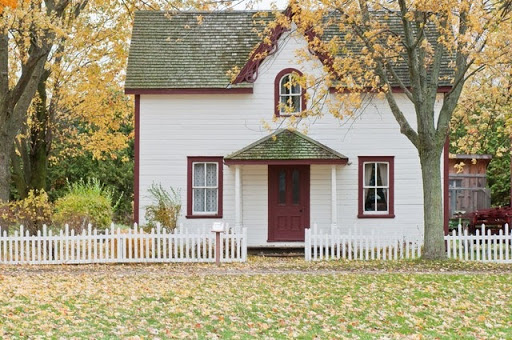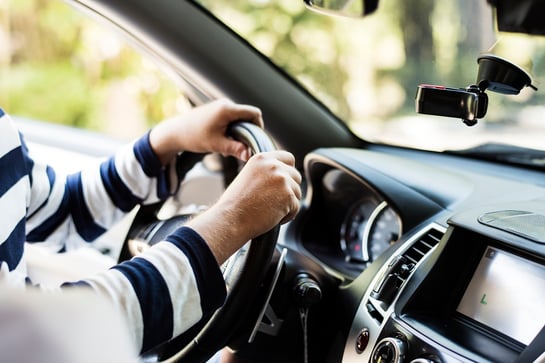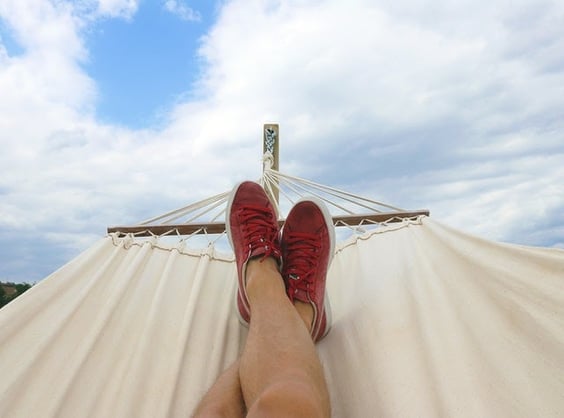I love to ask foreigners what they think of Americans. But how can we get them to tell us what they’re really thinking? Here are a few ideas:
- Ask them on the Internet, like AskReddit did (21K responses).
- Marry a foreigner, like I did (get 100% honesty).
- Have four kids with the foreigner (150% honesty, even when you don’t ask).
- Live abroad and work with foreigners (who are trying to understand Americans).
- Host an exchange student (truly fun - and enlightening).
ICES recently asked foreign exchange students from around the world: what are the things about Americans that surprise you? Let’s combine their observations with my list of all time favorites from books, the Net and plenty of personal experience living and working with people from around the planet.
This is a list of things that are perfectly normal in the USA - but maybe not in other countries. Let’s dive in and see how Americans can surprise foreigners.
1. Americans talk to strangers at the supermarket.

“People talk randomly in the store even when they don’t know each other”, says ICES student Ysaline from France. This is perplexing to many foreigners - including my daughters (who have grown up in Spain). “Mom, it’s so embarrassing, please don’t talk to people you don’t know,” they beg me. “You always told us not to talk to strangers!”
But it’s just an American thing. There are strangers. And then, there are strangers (like in line at the grocery store). We can - and do - talk to them, freely, about things many cultures around the world would reserve for friends and family.
In her book The Culture Map, Erin Meyer describes “peach vs. coconut” cultures. In many cultures people learn to be like coconuts, with a hard shell that’s tough to crack, but once you do, you are in. In the USA we learn to be like peaches, soft on the outside, but with a hard pit all the way in the center - where our real relationships take place. So, it’s easy to sink in, but that doesn’t mean we’re your new BFF. And this can be confusing for a foreigner who thinks something unique just happened while standing in line to pay for milk.
2. Americans give guests a tour of our home.
 American hospitality is both famous and puzzling for people from many cultures. I’ve heard many Spaniards marvel that American families open their homes to host exchange students for a whole school year. It’s so generous… but why do they do it?
American hospitality is both famous and puzzling for people from many cultures. I’ve heard many Spaniards marvel that American families open their homes to host exchange students for a whole school year. It’s so generous… but why do they do it?
And then there’s the house tour. As one Japanese visitor describes it, “The Americans were very kind to invite me into their homes for dinner, but always, as soon as dinner was over, they would ask if I wanted to take a tour of their house as if it was some sort of monument. I really did not want to, but I could not tell them no, so I said, ‘Yes, please’.” (For 44 more statements like this by foreigners, check out L. Robert Kohls’ book Developing Intercultural Awareness.)
3. Americans wear shoes in the house.

“(Americans) wear shoes in the house and have carpets,” reports ICES exchange student Genny from Korea. She’s onto a big secret that anthropologists like Geert Hofstede talk about: every culture has its own rules for hygiene. In other words: hygiene is less scientific, and more cultural, than we think.
And, just in case you doubt that people from other cultures could question hygiene in US homes, don’t miss Paul Hiebert’s entertaining article, “Clean and Dirty: Cross-cultural Misunderstandings”. Truly enlightening.
But why do Americans wear shoes in the house? Probably because it takes too much time to be taking them off and putting them on (again and again) - and we have discovered that “shoes on carpets” is quite harmless.
4. Americans give hugs.

Maare from Spain missed her country’s traditional kisses on the cheek while she studied in the USA for a year. But she should have been able to get a hug!
I’ve heard foreigners observe that Americans tend to stand far apart (by their standards), stretching out a hand for you to shake. And then, when you least expect it, someone will give you a great, big hug.
5. Americans admit that they don’t know.

“The first time my professor told me: ‘I don’t know the answer - I will have to look it up,’ I was shocked.” This student from Iran was quoted in Developing Intercultural Awareness, but surely many people from around the world have made similar observations. In many cultures, a teacher should know the answer (even if it means making something up) or suffer humiliation. In the USA, we accept that we can’t know everything - and we don’t need to know everything, which leads to our culture of “looking it up” and asking questions. It’s even common for American’s to remind each other that “there’s no such thing as a stupid question”.
6. Americans teach their kids to be independent.
 People in Spain - and around the world - are shocked that Americans encourage their kids to leave home around the age of 18. Why? And how can we let younger teens get a job? And drive a car?
People in Spain - and around the world - are shocked that Americans encourage their kids to leave home around the age of 18. Why? And how can we let younger teens get a job? And drive a car?
In many countries around the world, parents are aiming for interdependence - not independence. Kids stick around the nest until they finish college or marry. The American focus on teaching independence seems harsh and unnecessary to many people from other cultures.
7. Americans supervise kids in surprising ways

Although Americans encourage kids to fly the nest at a relatively young age, it's typical for American parents to provide a lot of oversight until that time. How many foreign exchange students have been shocked because their US host parents insist on knowing where they are at all times? For example, they might ask teenagers questions like, “Where are you going? When will you be back? Who will you be with?" And even saying things like: “I need to meet your new friend’s parents before you go out” or “give me phone numbers of two or three friends in case you don’t answer my calls and I need to reach you.”
In the USA, parents are generally expected to keep an eye on their kids. Many parents carefully supervise and restrict what younger children watch on TV. And then there’s the famous Florida mom who was arrested for letting her 7-year-old daughter walk to the park. And while teens may get more freedom than 7-year-olds, parents are still expected to be responsible for their safety and wellbeing in ways other cultures might consider overprotective (as they look through the lens of their own culture, of course).
8. Americans enjoy “me time” and solitude

The first foreigner to express shock at “American loneliness” was a Mexican engineering student at my university. And I was puzzled! What was he talking about?
“Everywhere you go, you see people alone,” he explained. “People eating alone, sitting alone; there are old people alone. People are very lonely in this country.”
Many Americans truly enjoy solitude: walking alone, savouring a meal alone, sitting alone on a bench or on the beach, just spending time alone. And this shocks people from group-oriented (collectivist cultures) around the world. “Why would anyone ever want to be alone?” they wonder.
9. Americans live far away from “everything”

Okay, so not all Americans live in remote areas, but many do need a car to get around. As foreign exchange coordinator Carly observes, “In many cultures, students go to school in the morning and arrive home on their own via public transit or walking, as the public transit systems are very well planned in many countries. Having to rely on host parents for a ride is different for them even though for host parents it is commonplace to be giving rides daily!”
Americans love suburban (and even rural) life, and this shocks many foreigners. How can we live without public transit - and so far from work, school, shops, church, friends?
It’s a culture shock that takes time to understand.
10. Americans don’t walk. (Seriously?)

Of course Americans walk - for exercise. But foreigners from many countries are surprised that Americans don’t walk to do daily business: shopping, going to work or school or church or the bakery and so on.
Cars dominate the planet, but in many countries people still do a lot more walking. When my Spanish in-laws first visited their son near Seattle, they walked several miles to the grocery story, and the police stopped to ask if they were okay. A big surprise, indeed!
11. Americans make everything so big.

“You know, there are no small eggs in America. They just don’t exist. They tend to be jumbo, extra large, large or medium. It doesn’t matter that the medium (eggs) are little. Small eggs don’t exist (in America) because, I guess, they think that might be bad or denigrating.” That’s my favorite quote in Developing Intercultural Awareness, and it was made by a Dutch visitor.
And it’s not only the eggs that are large, or the Dutch who are surprised. Many exchange students from Spain have made similar remarks after a year in the USA: big houses, big streets, huge distances, very large food, humongous portions, gigantic soft drinks (Big Gulps?), extra-large products, XXL packages, jumbo everything.
12. Americans walk around with food and drinks.

Foreign visitors to the US are fascinated with our food - and how we eat it.
“One thing that I think is strange and different from Italy is lunch,” says an ICES Italian student who spent a year in Texas. “I find it strange because when I was [in Italy], I used to eat lunch with my whole family, and my mom cooked for everybody, while here we eat a sandwich or whatever we want but not together.”
In many countries food is serious business. People stop, sit down, and eat together. And they take their time doing it. When they see Americans walking around with hotdogs and huge cups of coffee, they must restrain themselves from gawking, I’m sure.
Here are some food-related comments about us Americans I’ve heard over and again:
- We eat in class - students, and in some cases even the teacher.
- We eat alone (sometimes/often) vs always together.
- We eat when we’re hungry vs on a rigid schedule.
- We eat many foods with our hands--think french fries and pizza. Many countries use a fork and knife for these foods!
- We eat special diets, like keto, paleo, vegetarian etc.
- We put sugar in bread.
- We put ice in drinks.
- We eat ice cream even in the winter.
- We drink huge coffees.
- We ask for a doggy box.
- We split the bill (vs taking turns).
- We tip waiters.
13. Americans add sales tax at checkout.

This drives my daughters crazy. As in many countries, prices in Spain include sales tax, so there are no surprises at checkout. Every time we go to the US, they forget about sales tax until they make that first purchase...
Other money-related surprises for foreigners include: We get into debt during college, and we shop till we drop. “People (in the USA) order so many things online,” notes Octavio from Spain. “In my culture we usually go more to shops, instead of buying everything online.”
ICES student, Jenny from China, has noticed that money has uniform color and size. Around the world countries are churning out colorful money in many shapes and sizes that make it easier to differentiate between different amounts. In the USA, it’s “you snooze; you lose”, so pay attention to those bills.
14. Americans make learning fun and practical.

Students from around the world are pleasantly surprised by how fun it is to go to school in the USA. One foreign exchange student told me, “School in the US is like an amusement park. In my country it’s like being in prison.” He was half joking, but I got the point.
The mother of another exchange student laughed when she told me, “My son called today, and he was very excited about school. He said, ‘Mom! They’re teaching me how to think!’” He was used to memorizing entire chapters from his textbooks. Critical thinking was a breath of fresh air - but also a big shocker.
In the USA people generally believe in “lifelong learning”. And that means that kids need to like it and want to keep doing it. People also want to see practical results (like real jobs and high employment rates), so school tends to be as practical as possible.
Here are more school-related things that can surprise or shock foreigners:
- Teachers act like coaches.
- We choose our classes vs following a rigid curriculum.
- We use lockers at school vs staying in one classroom all day.
- We give multiple choice tests.
- Even teachers can admit they don’t know something.
15. Americans talk about time as if it were money.

When Americans go abroad, we are shocked to discover other ways to conceive of time. When foreigners visit the USA, many have to adapt to the “time is money” concept. One Spanish businessman said, “I arrived late to a first meeting with a potential client and never got a second chance.” See! Time is money (in the US, at least).
What does it mean to be punctual? What does it mean to be late? It depends on where you come from. Here in Spain, we can arrive 10 or 15 minutes late without creating too much of a fuss. But according to a Nigerian friend of mine, “African time” is even more flexible.
Meanwhile, back in the USA, we “buy time”, “spend time”, “use time”, “get time”, “give time”, even “save time” and “invest time”. Time is a precious commodity, a scarce resource, a treasure to be “spent wisely”. Foreigners learn quickly not to “waste” our time - or else!
16. Americans take a lot of pills.

TV advertisements for prescription drugs create culture shock for many foreign visitors to the USA. In many countries, doctors are the only audience for pharmaceutical companies wishing to sell prescription meds.
But foreigners who have American roommates are also shocked by pill boxes, whether they contain supplements, vitamins or prescription medications. And they are even more shocked when we talk about the meds we’re taking and the conditions we’re treating. (And BTW: this is even more shocking when we do this in public places, in line at the grocery store or, as I have witnessed: even at McDonald’s).
17. Americans tolerate gaps in bathroom doors.

People from around the world go into a public restroom in the US and find... large gaps in the doors! Where is modesty, decency and privacy? Even I feel shocked after living in Spain for 25 years, and getting used to more privacy in public restrooms.
But why are there large gaps in bathroom doors in the US? According to this article at Technology.org, mass-produced bathroom stalls are cheaper to make, but then prone to smaller or bigger gaps in the doors depending on who assembles and installs them.
And get this: the huge gaps under the doors and between the stalls are intentional! They make it easier to clean the stalls, check if someone is inside, and notice if someone has passed out “in there”. It’s true we have much more privacy in public restrooms in Spain, but they must be much harder to clean - and often that shows.
But when it comes to “easy cleaning”, can any Western bathroom compete with squat toilets in Asia that can be hosed down along with everything else?
18. Americans “pitch in”.
 My Spanish husband was quite surprised! A new American friend had invited him to a work party, announcing: “Everyone meets at my place on Saturday morning to lay concrete for my driveway.” Why wouldn’t he just hire a construction crew?
My Spanish husband was quite surprised! A new American friend had invited him to a work party, announcing: “Everyone meets at my place on Saturday morning to lay concrete for my driveway.” Why wouldn’t he just hire a construction crew?
The USA was built by pioneers who came together to build barns and schools, to gather hay, to put out fires - and much more. Today, many people in the USA continue to pitch in and help their friends and neighbours with all kinds of projects. And this can shock many foreigners.
19. Americans go to church.

Again: not every American, of course. But foreigners from many European countries, for example, are surprised by how many people actually attend church in the USA regularly. The rates are much higher than many places in Europe.
And not only do more Americans attend church than is common in many other countries, but many Americans also attend more often. It's not unusual for people to attend various services several times each week.
20. Americans work a lot.

Europeans are shocked by how much Americans work, and how little paid vacation we get - if we even get it at all. But consider that the gold standard in Europe is one month paid vacation for everyone, and that doesn’t include all the public holidays.
Every American should read “Americans at Work - A Guide to the Can-Do People” by Craig Storti to see how foreigners might see us at work. The book is written for foreigners who are trying to understand what makes us Americans tick in the workplace. It’s a great guide to how we can create little “cultural surprises” in meetings, via email, when negotiating - and even by just opening our mouths at work.
21. Americans don’t work very much.

People from Asian countries like China and Japan, however, might comment that we don’t work very much. “Before I came to America, I always heard how hardworking Americans are,” one Taiwanese visitor is quoted in Developing Intercultural Awareness. “But compared to my people they don’t seem to work very hard at all. Why, Americans only work five days a week.”
So, like many things, the perspective on whether Americans work a lot or a little depends on where you’re coming from.
22. Americans display the flag (a lot).

In the USA we take it for granted: the American flag is ubiquitous. But foreigners, including ICES student Jenny from China, do notice it - and they can be quite surprised that we hang it in our yards, stick it to our cars, wear it on our shirts, shorts and even underclothes, and we frequently show it in our movies. Yes! I never noticed it, but my husband faithfully points out the American flag in movie after movie…
Then we pledge allegiance to the flag, and that can be a shocker too. But when it comes time to talk about politics, beware! Woe to the foreigner who talks politics without knowing how to do so - or not - in the USA.
23. Americans ask foreigners surprising questions.

Foreigners are often shocked by the questions Americans ask about their countries. Here are two examples from Developing Intercultural Awareness:
- First, an Indonesian visitor says: “I have been offended by how little most Americans know about my country. Either they think it is completely underdeveloped or a jungle full of wild animals...”
- Second, an Algerian visitor says: I was horrified at the ignorance of high school students about my country - Algeria. They knew nothing about it - location, people, language, political condition…”
I’ve heard many similar complaints, but this is a misunderstanding. Instead of feeling offended, foreigners should feel curious. They should wonder why we do this.
Here are a few possible reasons:
- The US is a world leader; it’s logical that people in other countries know more about the USA than vice versa.
- Schools in the US do not promote an encyclopedic knowledge of the world as in many countries - for worse, but also for better.
- Americans learn to accept ignorance of many things in order to pursue the subjects they are passionate about.
- And, Americans are not ashamed to say, “I don’t know” or “let’s look that up”.
- Finally, in the US, asking questions is positive - and it’s part of our culture.
Maybe we Americans could help foreigners by explaining our culture to them. Do Americans do weird things? By their standards, yes. The question is, “Why?”
Here are two great resources to help us talk about why Americans do the things the they do - strange or otherwise:
The author claims these 13 values explain 95% of all American behavior. Whether you agree or disagree, you will gain plenty of food for thought.
This book is written for foreigners, but every American should give it a read. It will be hard to deny this self-portrait.
And here are a few more lists of strange things Americans do:
33 Normal Things in the US that Freak Everyone Else Out
One of many Internet lists that are fun to browse - and resonate with my long experience living abroad and working with people from around the world.
24 Things That Are Normal in the US but Weird Elsewhere
Another fun Internet roundup.
Business Insider Highlights Some AskReddit Survey Results
Just another mirror to look at ourselves in.
Don’t miss this video by Dani Watts from New Zealand. She spent a year in the US and discovered some very funny things Americans do.


